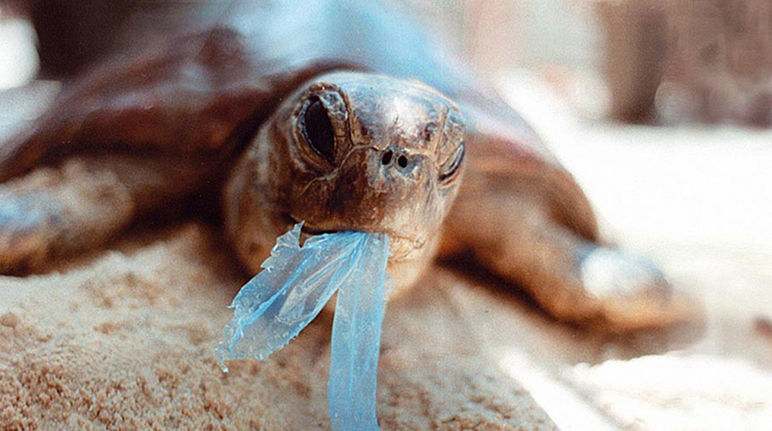Ban plastic bags in the EU
 Ever more deadly plastic waste is accumulating in the oceans. (photo: Ron Prendergast) (© Ron Prendergast / Melbourne Zoo)
Ever more deadly plastic waste is accumulating in the oceans. (photo: Ron Prendergast) (© Ron Prendergast / Melbourne Zoo)
Eight billion plastic bags end up as litter every year in Europe alone. They are not only a blight on the countryside and seas – they can be deadly for seabirds, seals, sea turtles, whales and other marine life. Please sign our petition calling for a ban of plastic bags in the EU.
News and updates Call to actionTo: Members of the EU Parliament, the EU Council of Ministers and the governments of the Member States
“Call on the EU to protect marine life with a complete ban on plastic bags.”
Plastic bags have become a symbol of our consumer society and our casual attitude toward disposable products. Europeans use around 200 such bags every year – that’s more than 100 billion in total. Thin plastic bags are usually used for a very short time – on average about 20 minutes – yet it can take centuries for them to degrade.
Eight billion such bags are not disposed of properly, leaving them to flutter through the countryside and accumulate in bodies of water. Huge garbage patches consisting mainly of plastic waste have accumulated in the oceans as a result.
Plastic bags can be deadly for marine life. Above all seabirds, but also sea turtles, seals and sperm whales often mistake plastic drifting in the water for food. At least one million birds suffer a slow, painful death every year from swallowing plastic waste.
Sunlight and wave action breaks the plastic down into smaller and smaller particles that remain floating in the water. Fish are ingesting increasing amounts of these particles instead of plankton – thus putting plastic waste on our dinner tables.
It would be easy for us as consumers to dispense with disposable plastic bags and use durable bags for our shopping instead. Rainforest Rescue therefore advocates a complete ban on plastic bags.
The EU now wants to delegate the responsibility for this issue to its member states, leaving them to decide whether to charge for bags, establish targets for reducing consumption, or ban the bags altogether. In April, the European Parliament voted to reduce the consumption of thin, disposable plastic bags by 80 percent within five years. The draft legislation will now be submitted to the EU Council of Ministers and a final decision can be expected in the autumn.
Please sign our petition to the responsible policymakers.
BackgroundPlastic waste in the oceans
Of the plastic bags used in the EU, thin disposable bags make up about 90% of the total. After being used for an average of 20 minutes, they are thrown in the trash. Being extremely lightweight, the wind often blows them away from market stalls or out of trash bins. The few brief minutes of use are contrasted by the decades or centuries that such bags need to degrade.
While waste thrown overboard from ships accounts for some of the plastic pollution of the oceans, the bulk of the litter is borne by rivers. Since plastic is lighter than water, it floats and can be transported thousands of kilometers by currents, wind and waves. Huge vortexes of waste have formed, the best known being the Pacific Garbage Patch, a swirling mass covering an area larger than Central Europe.
Marine animals and plastic
Plastic has already been found in the digestive tracts of at least 267 different species of animals. Sea turtles and sperm whales frequently mistake plastic bags and films for jellyfish or squid.
Seabirds are most frequently affected, however. Plastic junk floating on the surface apparently closely matches the attributes of their prey. Our discarded plastic is killing wildlife even in the most remote corners of the world – for example in the Midway Atoll in the Pacific, an albatross hatchery. The following four-minute video contains graphic images of albatross chicks dying or already dead among washed-up trash, their bodies filled with plastic from the ocean. For more information, please visit http://www.midwayjourney.com/
MIDWAY a Message from the Gyre : a short film by Chris Jordan from Midway on Vimeo.
Wave action and the UV radiation of sunlight break the plastic down into increasingly smaller pieces. It continues to drift in the water, and in some marine areas the ocean has already been shown to be richer in plastic particles than plankton. The plastic also releases toxic substances as it degrades. Fish and whales that feed on plankton thus also ingest the plastic particles and toxins. Further up the food chain, the toxins concentrate in predatory fish – and ultimately, in humans.
Figures on plastic bag consumption in the EU
The consumption of plastic bags per inhabitant in the EU countries varies considerably according to a study on behalf of the EU Commission. Bulgaria is the sad leader with 421 plastic bags (disposable and reusable) annually per inhabitant, followed by the Czech Republic (297). By contrast, Ireland accounts for only 18 bags annually per inhabitant. Plastic consumption is particularly high in the southern EU countries (Greece 269, Romania 252, Italy 204), while the more northern countries have lower values (Luxembourg 20, Austria 51, Germany 71). The average for the 27 EU Member States is 198 bags per year.
Regulations in the EU and Member States
Some states such as France and Italy have tried to limit the consumption of plastic bags with prohibitions. These, however, conflict with current EU legislation. Taxes or fees are permissible, and they have been introduced in several European countries. In Ireland, a levy of 44 cents per plastic bag has caused consumption to plummet from 328 to 18 plastic bags per inhabitant in 2010.
New EU draft legislation
The European Parliament’s new draft legislative resolution is designed to give the Member States greater scope for action. In addition to national regulations to reduce consumption or taxes and fees, it would permit individual states to ban plastic bags altogether. The document also contains proposals by the European Parliament Committee on the Environment. These include reducing the consumption of thin plastic bags (less than 0.05 mm wall thickness) EU-wide by 50% by 2017 and by 80% by 2019. Thin disposable bags make up about 90% of the EU’s total consumption.
While these are steps in the right direction, the time frame is very long, and an 80% reduction means that around 20 billion plastic bags annually will still be allowed. Please do your part and avoid using them wherever you can.
Further reading:
Draft European Parliament legislative resolution on the proposal for a directive of the European Parliament and of the Council amending Directive 94/62/EC on packaging and packaging waste to reduce the consumption of lightweight plastic carrier bags
To: Members of the EU Parliament, the EU Council of Ministers and the governments of the Member States
Ladies and Gentlemen,
The EU is set to vote on proposed legislation to reduce the use of plastic bags.
At least 8 billion plastic bags end up as litter in the EU every year, leaving them to pollute the environment for centuries to come. Floating plastic waste in the oceans is a particularly grave problem, causing the deaths of one million seabirds every year. Sea turtles, seals and whales also suffer slow, painful deaths after swallowing plastic.
As the plastic breaks down into ever smaller fragments, it is ingested by fish and thus also enters the human food chain.
Plastic bags are largely unnecessary. They can easily be replaced by durable and reusable shopping bags and shopping baskets made of other materials.
Please vote for a drastic reduction of plastic waste in the EU and speak out for a swift ban on plastic bags – for a future without plastic litter.
Sincerely,














 Recent successes
Recent successes